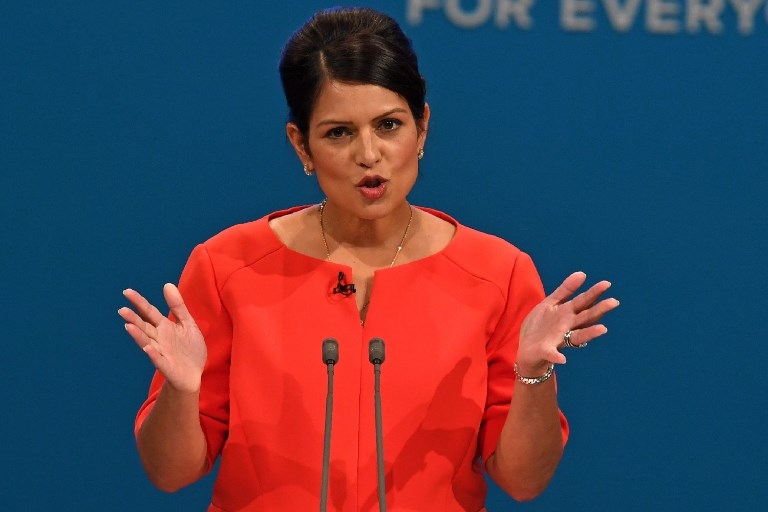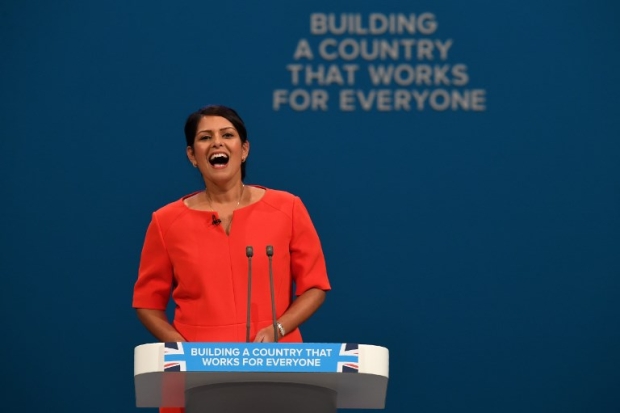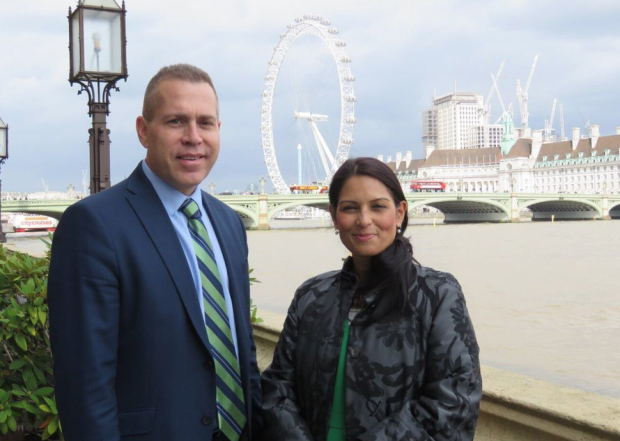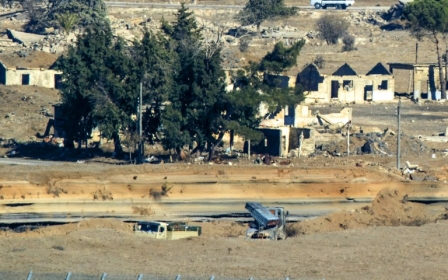Priti Patel visited Israeli military hospital in Golan: Report

A UK minister embroiled in a row over undisclosed meetings with Israeli officials this summer visited a military field hospital in the occupied Golan Heights, Israeli daily Haaretz has reported.
According to the paper's report, International Development Secretary Priti Patel visited the facility which treats Syrian refugees and victims of the civil war. The visit, however, was not listed in a statement released on Monday, detailing her previously undisclosed meetings during her holiday in Israel.
MEE has contacted the Department for International Development (DfID) and Patel's office to comment on the latest revelations. Patel has cut a diplomatic trip to Africa short and is on her way back to London on Wednesday reportedly on the orders of Prime Minister Theresa May.
In a separate development, the Jewish Chronicle (JC) has reported that Downing Street was aware of two of Patel's previously undisclosed visits, but told the secretary not to include them in her list on Monday because they would embarrass the Foreign and Commonwealth Office. The JC's also claims that the British government was made aware of Patel's meetings with Israeli Prime Minister Benjamin Netanyahu "within hours" of the meeting.
Downing Street press office is denying the report. "It is not the case that anyone from Number 10 asked anyone from DfID to remove a meeting from the list that was published this week," a Number 10 spokesperson told The Guardian. "And it is not the case that the prime minister knew about Priti Patel's meeting with Benjamin Netanyahu before last Friday."
'Humanitarian operations' in Golan
In addition to undisclosed meetings with Netanyahu and other Israeli officials, Patel has come under fire for suggesting that money should be given to support ongoing "humanitarian operations" by the Israeli army in the occupied Golan Heights.
It was not immediately clear whether the facility she allegedly visited in the Golan Heights and the operations she hoped to fund are one and the same.
However, in a statement earlier this week, a DfID spokesperson said that the secretary had discussed ways to provide medical support for Syrian refugees who are wounded and cross into the Golan for aid.
"The Israeli army runs field hospitals there to care for Syrians wounded in the civil war. But there is no change in policy in the area. The UK does not provide any financial support to the Israeli army," the statement said.
Patel has apologised for holding a series of meetings with Israeli politicians while being accompanied by a senior pro-Israeli lobbyist during a "family holiday".
The UK does not recognise Israeli sovereignty over the Golan, which was seized from Syria in the 1967 war. Providing aid to the Israeli army in the occupied territories would likely contravene UK policy and break international law.
Labour's shadow international development secretary Kate Osamor told Middle East Eye that Patel's actions were "deeply alarming" and "a clear breach of ministerial conduct".
"If Priti Patel doesn't resign, Theresa May must launch a full Cabinet Office investigation and uncover what really went on," Osamor told MEE.
"It raises more urgent questions about what was discussed in her meetings with Prime Minister Netanyahu and the foreign ministry, why no minutes were taken, and exactly what pressure she applied to her department."
Patel also met with Israel's Public Security Minister Gilad Erdan and foreign ministry official Yuval Rotem in New York in September.
Clarifications and conventions
On Monday, Patel clarified previous remarks to the Guardian newspaper on Friday in which she had appeared to suggest that the British Foreign Secretary Boris Johnson knew of her schedule beforehand.
A statement issued by Patel and the Department for International Development said: "This quote may have given the impression that the secretary of state had informed the foreign secretary about the visit in advance. The secretary of state would like to take this opportunity to clarify that this was not the case. The foreign secretary did become aware of the visit, but not in advance of it."
Patel also said: "This summer I travelled to Israel, on a family holiday paid for by myself. While away I had the opportunity to meet a number of people and organisations. I am publishing a list of who I met. The Foreign and Commonwealth Office was aware of my visit while it was underway.
“In hindsight, I can see how my enthusiasm to engage in this way could be misread, and how meetings were set up and reported in a way which did not accord with the usual procedures. I am sorry for this and I apologise for it."
Patel did not tell British diplomats that she was holding these meetings, which is the convention.
Andy Slaughter MP, a vice-chair of the Labour Friends of Palestine and the Middle East, described Patel's actions as the "final straw" .
"News that Priti Patel used her secret meeting in Israel to advocate sending aid to support the work of the IDF in the occupied Golan Heights should be the final straw for her," Slaughter told MEE.
"The UK is a significant donor to the Palestinian Authority but the future of that aid must be in doubt under a DFID Secretary of State who shows such bias and lack of judgement."
"Any other Prime Minister at any other time would have dispensed with Patel’s services by now, but Theresa May is too weak and isolated to act."
UK Prime Minister Theresa May cancelled Tuesday's cabinet meeting and said that she intended to tighten the ministerial code of conduct after it was revealed that Patel held secret meetings with Israeli officials.
New MEE newsletter: Jerusalem Dispatch
Sign up to get the latest insights and analysis on Israel-Palestine, alongside Turkey Unpacked and other MEE newsletters
Middle East Eye delivers independent and unrivalled coverage and analysis of the Middle East, North Africa and beyond. To learn more about republishing this content and the associated fees, please fill out this form. More about MEE can be found here.






